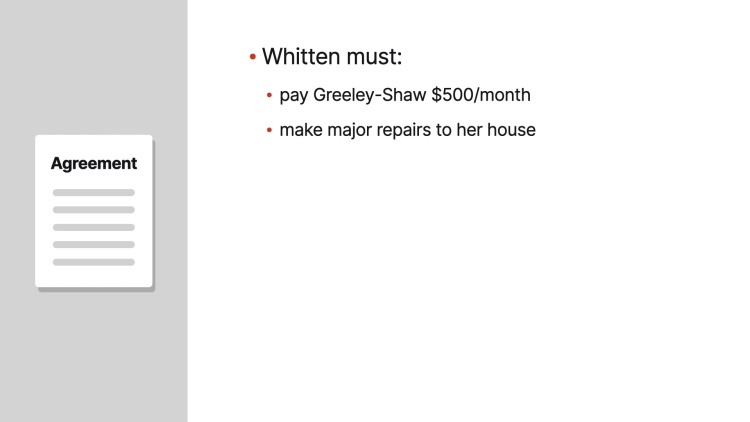Whitten v. Greeley-Shaw
Supreme Judicial Court of Maine
520 A.2d 1307 (1987)
- Written by Mary Pfotenhauer, JD
Facts
Shirley Greeley-Shaw (defendant) had an affair with George Whitten (plaintiff), who was married. Whitten provided Greeley-Shaw with the funds to purchase a house, and Greeley-Shaw executed a promissory note and a mortgage on the house in favor of Whitten. While Whitten was vacationing with his wife and friends at his vacation home, Greeley-Shaw came to the home and requested “something in writing” from Whitten to confirm promises Whitten had allegedly made to her. According to Greeley-Shaw, Whitten told Greeley-Shaw to draft something and that Whitten would sign it. Greeley-Shaw drafted a one-page document stating that Whitten agreed to make monthly payments to her, make major repairs to Greeley-Shaw’s home, pay for any medical needs, take one trip and provide her with one piece of jewelry every year, and visit and phone her at various intervals. The document also stated that Greeley-Shaw would not make any calls to Whitten’s homes or offices without his prior permission. Greeley-Shaw included this promise, because she felt that Whitten should get something in exchange for his promises. Whitten signed the document. Whitten later brought a foreclosure action against Greeley-Shaw based on her nonpayment of the promissory note. Greeley-Shaw counterclaimed for enforcement of the written document that she had drafted and that Whitten had signed. The superior court entered judgment against Greeley-Shaw on the foreclosure action and found that no enforceable contract was created by the written document. Greeley-Shaw appealed, arguing that the document that Witten signed gave rise to an enforceable contract and that she did not realize the significance of the promissory note and mortgage deed until after she signed them.
Rule of Law
Issue
Holding and Reasoning (Nichols, J.)
What to do next…
Here's why 910,000 law students have relied on our case briefs:
- Written by law professors and practitioners, not other law students. 47,100 briefs, keyed to 997 casebooks. Top-notch customer support.
- The right amount of information, includes the facts, issues, rule of law, holding and reasoning, and any concurrences and dissents.
- Access in your classes, works on your mobile and tablet. Massive library of related video lessons and high quality multiple-choice questions.
- Easy to use, uniform format for every case brief. Written in plain English, not in legalese. Our briefs summarize and simplify; they don’t just repeat the court’s language.





